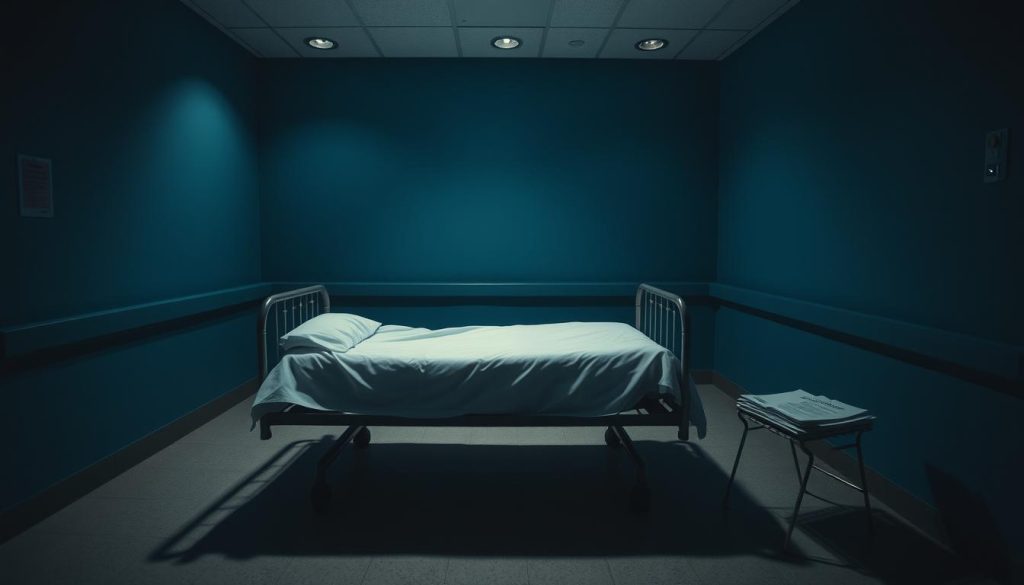The 5150 code is a crucial part of California’s mental health emergency protocols. It allows for an involuntary psychiatric hold to protect individuals in severe mental distress. This unique legal provision helps those facing serious mental health challenges.
California’s Welfare and Institutions Code introduced the 5150 code in 1967. It was a pioneering approach to mental health intervention. This code permits a 72-hour detention in a psychiatric facility for thorough evaluation.
The term has since gained popularity beyond its legal origins. High-profile cases involving celebrities like Britney Spears have increased public awareness. Now, 5150 is widely recognized as shorthand for urgent mental health situations.
Key Takeaways
- 5150 is a California law for emergency mental health intervention
- Allows 72-hour involuntary psychiatric hold for evaluation
- Implemented to protect individuals experiencing mental health crises
- Originated in 1967 as a progressive mental health approach
- Has gained cultural recognition through media exposure
What Does 5150 Mean: Understanding California’s Mental Health Code
The 5150 code is vital in California’s mental health system. It provides a legal framework for temporary detention and evaluation of people in severe mental crises3. This provision helps address urgent mental illness situations while ensuring safety.
California law allows a 5150 hold when someone meets specific mental health criteria. These include being a danger to themselves or others. It also applies when someone can’t care for themselves due to mental illness3.
- Being a danger to themselves
- Presenting a threat to others
- Experiencing grave disability preventing self-care3
Legal Framework of Involuntary Detention
Various authorized personnel can initiate a 5150 hold. These include licensed crisis team members, police officers, and mental health professionals4. The hold allows for a thorough psychological evaluation lasting up to 72 hours3.
Key Requirements for 5150 Hold
Implementing a 5150 hold requires careful assessment. Professionals must determine if the person can’t meet basic needs or poses immediate risk. If needed, a 5250 hold can extend care for up to 14 days4.
The primary goal is to ensure safety and provide appropriate mental health intervention.
Patients under a 5150 hold have important rights. These include legal representation and the chance to present evidence during extended detention hearings4.
Implementation and Professional Authority in 5150 Cases
Mental health professionals play a vital role in managing crises through the 5150 hold process. California’s psychiatric assessment protocols allow specific healthcare experts to start emergency interventions5. Doctors, psychologists, psychiatric nurses, and physician assistants can fully implement these crucial measures6.
Police and ER staff can start a hold, but need approval from mental health experts. They must carefully assess if someone is a danger to themselves or others5. During the 72-hour hold, ongoing evaluation determines the best treatment plan6.
Professionals must carefully document the patient’s condition, rights, and reasons for detention6. This process ensures safety while respecting individual autonomy. Facilities must provide information in an understandable language and protect the patient’s belongings6.
The 5150 hold aims to provide compassionate care, not punishment. Mental health experts work to find the best support for recovery5. This approach shows the importance of trained professionals in handling mental health emergencies.
FAQ
What exactly does a 5150 code mean?
Who can initiate a 5150 hold?
How long does a 5150 hold last?
What criteria must be met for a 5150 hold?
Can a person be released before the 72 hours are complete?
What rights do individuals have during a 5150 hold?
How does a 5150 hold differ from regular psychiatric admission?
What happens after the 72-hour hold?
Can a 5150 hold be used for substance abuse issues?
Are 5150 holds confidential?
Source Links
- 5150 Meaning & Origin | Slang by Dictionary.com – https://www.dictionary.com/e/slang/5150/
- What You Need to Know About 5150 and 5585 Codes | Life Skills Awarenes – Life Skills Awareness – Individual And Couples Therapy – https://www.lifeskillsawareness.org/blog/what-you-need-to-know-about-5150-and-5585-codes
- Navigating the Involuntary (5150) Hold Process – brochure – https://www.ochealthinfo.com/sites/hca/files/import/data/files/39874.pdf
- What Is a 5150 in California?: What to Know | Simmrin Law – https://www.simmrinlawgroup.com/faqs/what-is-a-5150-in-california/
- 5150 Hold: What You Should Know | Clear Behavioral Health – https://clearbehavioralhealth.com/5150-hold/
- 2024 California Code :: Welfare and Institutions Code – WIC :: DIVISION 5 – COMMUNITY MENTAL HEALTH SERVICES :: PART 1 – THE LANTERMAN-PETRIS-SHORT ACT :: CHAPTER 2 – Involuntary Treatment :: ARTICLE 1 – Detention of Persons with a Mental Health Condition for Evaluation and Treatment :: Section 5150 – https://law.justia.com/codes/california/code-wic/division-5/part-1/chapter-2/article-1/section-5150/
